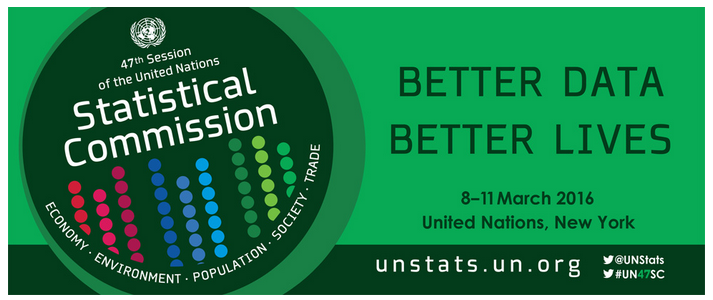The UN Statistics Division held a high-level dialogue between the political and statistical communities to discuss the institutional and statistical prerequisites to meet the data needs for the 2030 Agenda for Sustainable Development.
 4 March 2016: The UN Statistics Division held a high-level dialogue between the political and statistical communities to discuss the institutional and statistical prerequisites to meet the data needs for the 2030 Agenda for Sustainable Development.
4 March 2016: The UN Statistics Division held a high-level dialogue between the political and statistical communities to discuss the institutional and statistical prerequisites to meet the data needs for the 2030 Agenda for Sustainable Development.
The dialogue focused on the theme ‘Towards Better Information Systems for the 2030 Agenda,’ and took place on 4 March 2016, in New York, US. Speakers highlighted: the monitoring and reporting requirements of the 2030 Agenda; the need for high-level political support for the design and implementation of national multi-dimensional information systems; strengthening civil registration and vital statistics (CRVS) programmes; the creation and maintenance of statistical business registers; the use of administrative data and Big Data; and the creation and maintenance of built and natural environment data and their application to the ‘geo-statistical’ dimension of the multi-dimensional information system.
Opening the meeting, Mogens Lykketoft, President of the UN General Assembly (UNGA), observed that the complexity of the agenda is an “unprecedented statistical challenge,” and therefore innovation and reform in statistical practices are essential. This includes, he said, the use of both traditional and non-traditional data sources and instruments, including geospatial and big data. Calling for leaving no one behind and “leaving no one uncounted,” he also stressed the need for: maintaining high quality registrars, essential for good governance and effective policy development; strengthening the national statistical capacity, which requires effective institutional arrangements and sufficient financial resources; increasing multi-stakeholder partnerships; and protecting against invasion of privacy and misuse of data. Ib Petersen, Permanent Representative of Denmark, stressed the need for high quality data, data comparability, data granularity, political leadership, and cooperation.
Masud Bin Momen, Permanent Representative of Bangladesh, noted that, in the Sustainable Development Goals (SDGs), several targets have needed more indicators, such as target 17.8 on the operationalization of a technology bank for the least developed countries (LDCs), which he said is not well covered by the current indicator on the number of people using the internet, or target 1.a on resource mobilization for poverty eradication, where the proposed indicators do not track development cooperation. He explained that LDCs’ concerns are not only about indicators, but also about how LDCs can collect and compute data for the vast number of indicators, and called for support to strengthen their national statistical offices (NSOs).
Mia Elisabeth Harbitz, World Bank, said well-functioning national statistical systems require legal frameworks, infrastructure, and information and communications technologies (ICTs), as well as the knowledge to operate them. She noted that interconnectedness and interruptibility between (and sometimes within) institutions and registers remains a problem, and gave the example of Uruguay, where her team found that the legal frameworks for marriage registrars were from 1880, or Namibia, where they found 65 unconnected data bases in the Ministry of Health. Harbitz also identified other challenges, including: the digital divide; the temptation to collect more data when the capacity to manage and use it is limited; and the lack of an internationally agreed definition of “protection of privacy.”
Lisa Grace Bersales, Philippines Statistical Authority, underlined the need for coordination and explained the benefits of the collaboration between the Regional Steering Group and focal persons for Asian and Pacific CRVS Decade, the Philippine Inter-Agency Committee on CRVS, local civil registrars, and solemnizing officers. The challenges she identified included: modernizing ICT for local registrars; making vital statistics publications timelier; and better harnessing civil registration to address data disaggregation requirements for the SDGs.
Raj Gautam Mitra, African Centre for Statistics, UN Economic Commission for Africa (UNECA), said the SDGs that will require data from the CRVS the most include: Goal 1 on poverty eradication; Goal 4 on quality education; Goal 5 on gender equality; Goal 8 on good jobs and economic growth; Goal 11 on sustainable cities and communities; Goal 13 on climate action; Goal 16 on access to justice; and Goal 17 on means of implementation and the global partnership. The major challenges that he highlighted included: a number of countries have not yet conducted an assessment or developed a plan, particularly in Western and Central Africa; monitoring at the country- and regional-levels is often weak; coordination with health ministries needs improvement; there are not enough resources available at the regional level on various technical fields to support implementation, such as causes of death, ICT, law, or vital statistics; donor coordination and “parachuting” with projects that sometimes are not aligned with the countries’ plans; and limited resources at the Secretariat.
Jorgen Elmeskov, Director General of Statistics Denmark, underlined the need for continued and reinforced work on coordination between different sources of data and across countries on comparability and dissemination. Mariana Kotzeva, Eurostat, stressed the role of collaboration at the regional level, as it reflects the regional specificities. She called for identifying the fundamentals that need focus when building statistics infrastructure, such as business units, geospatial frameworks, privacy and trust. Rolando Ocampo, INEGI Mexico, expressed support for creating a UN Commission on Spatial Information. [Seminar Information] [IISD RS Sources]